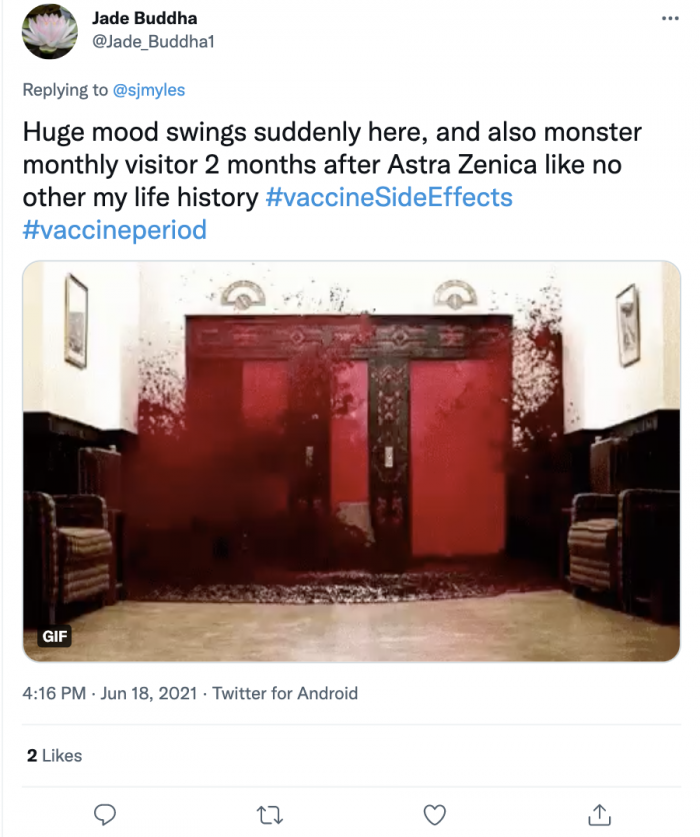“Hey girl, did your period change after your vaccine?”
“YES.”
I asked them one by one. I asked by text, through Slack.
Honestly, I think I personally know more women who remain unvaccinated than I know women who are, so I only asked 10. But out of the 11 of us (including myself), over a third of us experienced a noticeable shift in our cycles after vaccination.
One gal was delayed a week, the second waited an extra four days.
A third chica had the heaviest bleeding she’s had in quite some time.
A fourth has a cycle that remains wonky even months after vaccination.
Number five wasn’t sure she’d count sore boobs popping up earlier than usual as a menstrual change, but did notice it as somethin’ a li’l different.
I had the first “long period” in my life.
I normally bleed for five days total with a very predictable flow. After my first round of Pfizer three weeks ago, I spotted for three days leading into my period’s supposed start date, bled ultra lightly one day after I was supposed to start, had my usual flow for five days, then spotted every other day for three more days.
On the first day of not bleeding or teary-eyeing or mini-migraining in about two weeks, I thought, if a third of the women I know who’ve been vaccinated experienced changes in their cycle, maybe others have, too.
So, I asked Google. The first article I opened was an NPR piece.
Turns out that there have been hundreds of thousands of women who have experienced what they perceive to be menstrual changes after vaccination, as reported by Kate Clancy, a human reproductive ecologist and associate professor of anthropology at the University of Illinois Urbana-Champaign, and biological anthropologist Katharine Lee of Washington University School of Medicine in St. Louis.
Like me, Clancy started to ask around after she experienced some cycle changes of her own post-vaccination—”gushing” as if she were in her 20s again. She took to Twitter, and months after she posted her tweet, the responses continue to pour in from women reporting similar experiences.
https://twitter.com/KateClancy/status/1364671490772320259
If you’re like me and having children is your biggest, baddest life goal, or if you’re a feminist who knows that women’s bodies have historically been understudied when it comes to medical research, you’re probably reading this, getting a bit freaked out, and maybe a little pissed. That’s to be expected.
In Lee’s own words, you’re validated if this information plants doubt. “It makes people feel like their bodies were not considered in part of the [clinical] trial,” she said.
As someone who dragged her feet and thought she’d done enough research and talked to enough people who had nothing of note to share about their vaccine experiences outside of “the usual,” I’m feeling pretty spooked. But when I chose to get the vaccine, I chose it because I didn’t want to die, and because, in short, I didn’t want to accidentally kill. I chose to operate out of love instead of fear. Blah blah.
So, here’s some comfort by way of information.
Here’s what to expect and the possible why:
These changes to our cycle seem to be short-lived. For most they last only a cycle or two, which might explain my one friend’s “months-long” wonkiness in her cycle.
Changes include mostly heavy cycles or “breakthrough bleeding,” which is to say bleeding or spotting at unexpected times during the month (like me). This could, apparently, even mean having a period when you’re post-menopausal. Weird, right?
Well, one recent study shows how vaccines could possibly affect menstrual cycles. According to Alice Lu-Culligan, a Yale University MD-Ph.D. candidate who studies immunology and reproductive health, immune cells play a role in both building up and breaking down our uterine lining during our cycles. A vaccine, in other words, can change our immune response, and that can, in turn, affect how our uterine linings are shed.
So, basically, we shouldn’t quite panic. After all, our cycles are fragile and can be finicky. But also, we definitely shouldn’t be flippant.
While hundreds of thousands of women are reporting these changes, this doesn’t mean that a modified menstrual cycle as a response to vaccination is normal or even common. Moreover, there is bound to be a percentage of women reporting in who have experienced this change for reasons that are either only partially or not at all related to the vaccine.
Issues such as already irregular cycles, stress, weight fluctuation, medications, changes in birth control and even some herbal supplements can all affect our cycles. But even if these things are or previously have been factors in our cycle (ir)regularity before, that doesn’t mean there’s no link to the vaccine.
Read this whole thread:
https://twitter.com/KateClancy/status/1383529955993128965
Advice from the experts:
Both Lee and Clancy consider themselves to be pro-vaccine. Their primary concern is that for many, menstruation and fertility rumors surrounding the vaccine have fueled conspiracy theories and caused many (including, formerly, myself—maybe you?) to delay or skip out of vaccination. Because we didn’t expect something like this, to the skeptical, the information feels deliberately withheld. That’s a danger to public health.
So what do we do with this information?
Stay informed and don’t hide away in your proverbial cocoon. Help to inform, and report the adverse events you experience—even if it’s something that you perceive as “little,” like a strange period.
Let’s put it this way: when you go to get your vaccine, you read that paper and it tells you about the sore arm or headaches. You read about blood clots and about pericarditis. So when you receive a questionnaire asking about either really big or pretty little side effects such as these, and you’re not prompted to think about an irregular period as an “adverse event,” you’re probably not going to write it down, right?
https://twitter.com/KateClancy/status/1381648742709886976
Lee is sourced by NPR as having said that even she might not have reported her changes to menstruation as an adverse event. I might have—but that’s just because I’m paranoid about my fading 36-year-old reproductive abilities. So, keep your eyes peeled and, when given the chance, be detailed and precise about your experiences.
Here’s one reason it’s important to do just that:
Dr. Kathryn Edwards, a professor at Vanderbilt University School of Medicine, sits on an independent data monitoring committee for the Pfizer COVID-19 vaccine. Edwards acknowledged to NPR that in hurrying to test vaccines last year, all safety efforts went into spotting “truly dangerous” side effects. You know, like the ones that cause death of organs or entire beings. Edwards also reminded readers of the NPR article that minor or rare changes to menstruation might be missed due to a focus on those more serious adverse events of the vaccine.
But there’s safety in numbers and that’s why it’s extremely important for each of us to be our own health advocate.
Yeah, I know. That’s not very comforting. Especially if you’re fearing for your reproductive organs in hopes of being able to use them to grow a human someday.
So let’s break for emotion over rationality, here for a sec., because lord knows I need it:
I mean, simply put, getting pregnant is easier if you’re regular. If things go out of whack, it gets harder. And if it goes out of whack for a little while with this vaccine, and we don’t know much about it, what else don’t we know about what this might do in the long while? So many questions.
To be totally transparent, I’m trying really hard right now to be an optimist. Actually, this is a great example of flat-out bypassing—thinking, “You know, is humanity more important, or is my personal ability to have a child one day soonish?”
Truthfully? I’d be pretty f*cking devastated to find out that I rendered myself infertile choosing love for the people of the planet over fear…
Over a fear that a vaccine might make it harder or impossible to get pregnant.
Over a fear that people told me was unfounded.
Over a fear that media and science told me was unfounded.
Over a fear that, on the other hand, family told me was not unfounded.
Yeah, I’d be pretty damn f*cking devastated if I were in a grouping of people who were unlucky like that.
https://twitter.com/KateClancy/status/1384925980045848577
Some of you are with me, here. Some of you aren’t. Deep breaths.
I know these fears are likely unfounded. I know in a couple months, things’ll probably get back to normal—at least within my body; probably not in society. And maybe someday in the next couple years, I’ll hold a newborn babe in my arms that I’m even just that much more thankful for.
But, what now?
Vent away, first of all. Let’s let out our fears and frustrations and share good information while doing so.
But also, the National Institutes of Health published an article on August 30, announcing that it “awarded one-year supplemental grants totaling $1.67 million to five institutions to explore potential links between COVID-19 vaccination and menstrual changes.”
While Clancy and Lee were not among those awarded funds, you can still participate in their survey and play an active role in the still-developing picture of the vaccine and its effects on our menstrual cycles.
So now, we watch. And now we learn.
~












Read 44 comments and reply